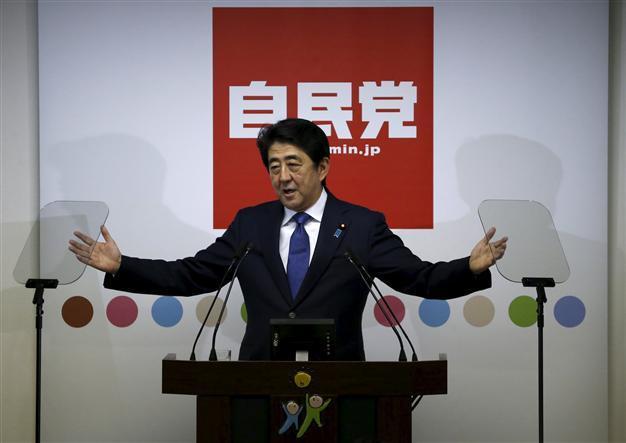Japan's Abe airs Abenomics 2.0 plan for $5 trillion economy
TOKYO - The Associated Press

Japan's Prime Minister Shinzo Abe, who is also the ruling Liberal Democratic Party leader, gestures during a news conference after he was re-elected as the party leader at the party headquarters in Tokyo September 24, 2015. Reuters Photo
Japan's Prime Minister Shinzo Abe, fresh from a bruising battle over unpopular military legislation, announced on Sept.24 an updated plan for reviving the world's third-largest economy, setting a GDP target of 600 trillion yen ($5 trillion).
Abe took office in late 2012 promising to end deflation and rev up growth through strong public spending, lavish monetary easing and sweeping reforms to help make the economy more productive and competitive.
So far, those "three arrows" of his "Abenomics" plan have fallen short of their targets though share prices and corporate profits have soared.
"Tomorrow will definitely be better than today!" Abe declared in a news conference on national television.
"From today Abenomics is entering a new stage. Japan will become a society in which all can participate actively."
Abe recently was re-elected unopposed as head of the ruling Liberal Democratic Party. He has promised to refocus on the economy after enacting security legislation enabling Japan's military to participate in combat even when the country is not under direct attack.
Thousands of Japanese held noisy street protests last weekend over the "collective self-defense" law, and Abe's popularity ratings took a hit.
"He has to deliver the message that he is so committed to achieving the economic agenda, that is, to make people's lives better," said analyst Masamichi Adachi of JPMorgan in Tokyo.
Abe said he was determined to ensure that 50 years from now the Japanese population, which is 126 million and falling, has stabilized at 100 million.
He said his new "three arrows" would be a strong economy, support for child rearing and improved social security, to lighten the burden of child and elder care for struggling families. But with Japan also committed to reducing its massive public debt, it is unclear how he intends to achieve those goals.
"There's nothing wrong with him saying he wants to achieve a better life for everybody. But how to achieve it is a different matter," Adachi said.
Abe recently announced plans to accelerate reductions in corporate taxes. The central bank also is widely expected to add to its already unprecedented monetary easing by pumping more cash into the economy later this year.
Japan's economy, estimated at $4.6 trillion in 2014, contracted at a 1.2 percent annual rate in the April-June quarter. Economists have warned that China's slowdown and market turmoil might weaken an expected recovery in coming months.
At Japan's recent pace of growth, achieving Abe's goal would be a stretch. Real GDP growth averaged 1.7 percent over the past five fiscal years. That's less than half the 3.0 percent pace needed to attain a GDP of 600 trillion yen by 2021.
The Japan Center for Economic Research, an independent think tank, is forecasting growth at 0.9 percent this year and 1.5 percent in 2016. A sales tax increase planned for April 2017, to 10 percent from 8 percent now, is expected to dent growth for that year.
Japanese officials acknowledge in private that the country needs a "great leap" in productivity, which is hard to attain at a time when the labor force is shrinking due to the aging population.
Given that reality, Japanese employers have been reluctant to invest or to raise wages, even when many are short-handed.
With wages still barely rising, families have tended to save, and increases in demand from monetary stimulus have been weaker than expected.
